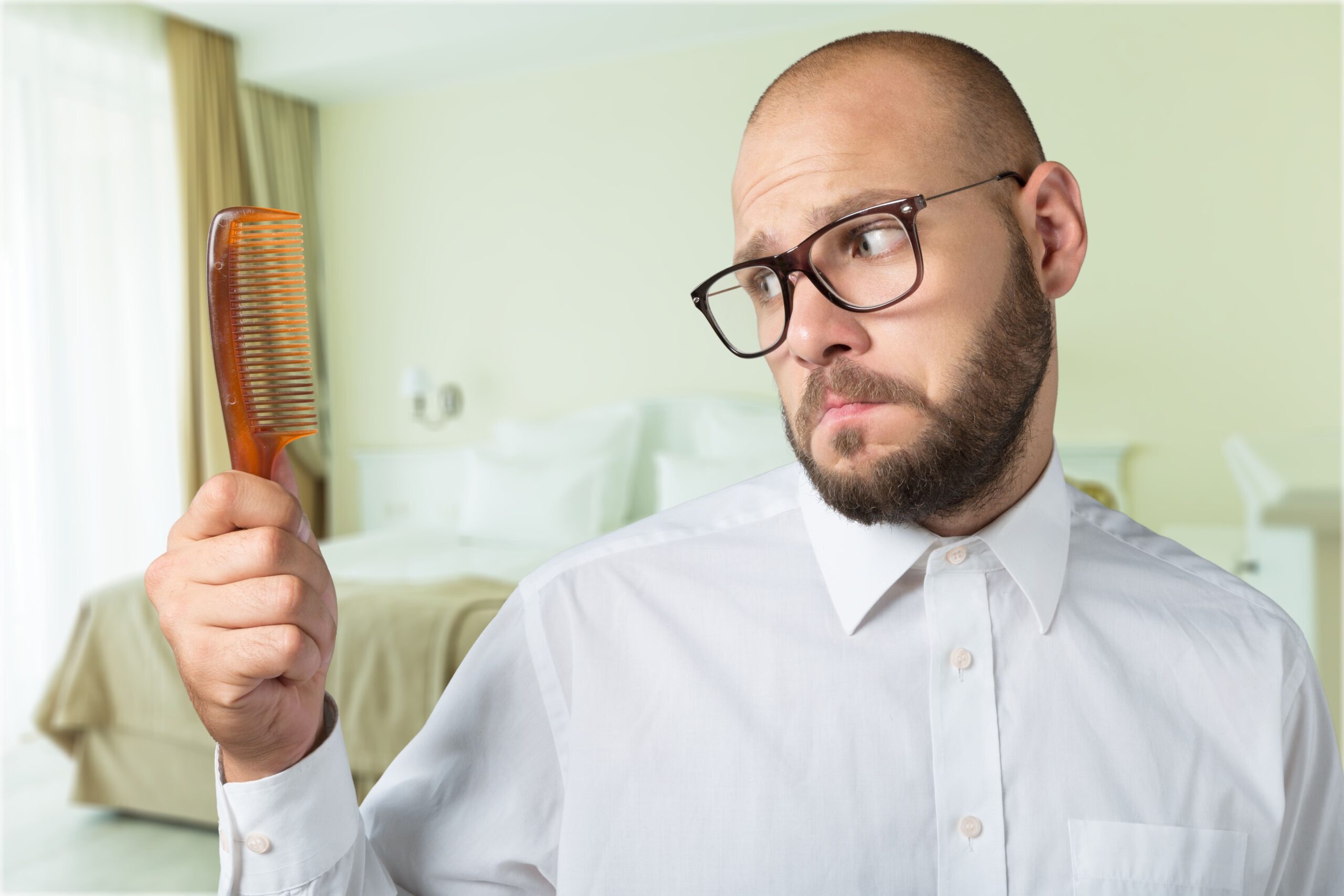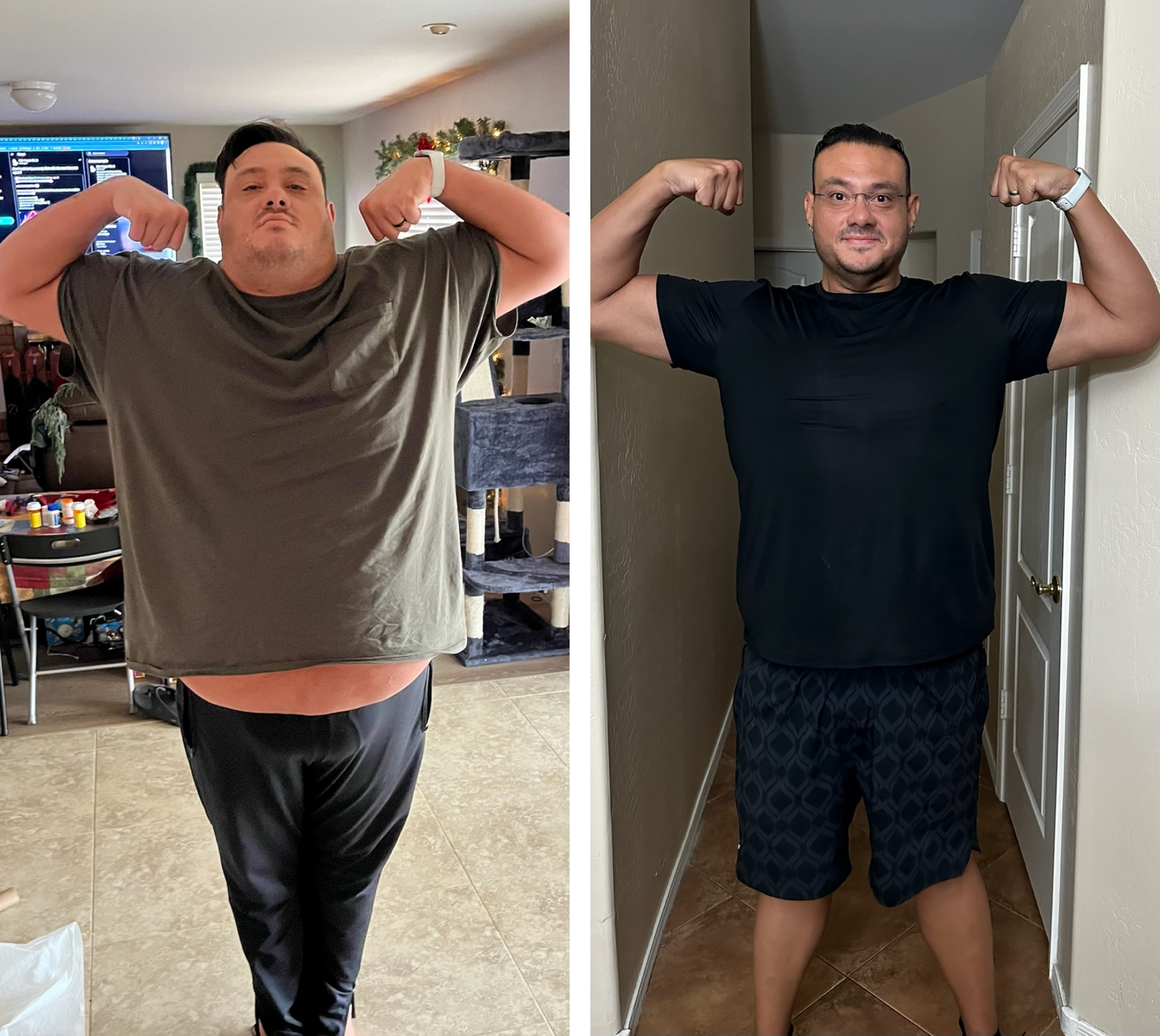Balding comes in many forms and can be caused by a number of hormonal, genetic, and environmental factors. Aging males are commonly affected by Androgenic Alopecia, also called male-pattern baldness; which as the name suggests, is caused by androgens or male sex hormones. Approximately 50 million men and 30 million women in the US live with hormone-related baldness.
How Testosterone Affects Hair Growth
Testosterone is responsible for the growth of body and facial hair which is triggered at the start of puberty. As men get older, T sometimes goes through molecular changes in the receptors which can cause balding.
The American Hair Loss Association explains that testosterone converts to DHT (dihydrotestosterone) using the Type II 5-alpha-reductase hormone, which is located in the oil glands of hair follicles. When DHT attaches to the androgen receptors, it can cause physical changes to the hair follicle, shrinking and deteriorating them until hair can no longer grow.
The enzymatic activity of 5-AR on testosterone happens primarily in the gonads and prostate, but new data reports that T is converted to DHT in the hair follicles as well. DHT tends to take over the T receptors since it binds more readily and stays attached for longer.
Scalp hair has three growth phases: anagen (active growth phase), catagen (transitional phase), and telogen (rest phase). For reasons not entirely understood, DHT encourages the hair follicles to stay in the catagen and telogen phases for longer, which stunts hair growth and makes the hair more susceptible to falling out.
Aging and Hair Loss
Hair loss has long been associated with male aging, but it wasn’t until recent years that scientists have confirmed this link. Researchers estimate that half of all men over 50 experience some form of hair loss, mainly male-pattern baldness.
The body’s ability to regenerate cells lessens as we age, this can mean brittle, breakage-prone hair that’s difficult to maintain. Our hair shafts tend to shrink and dry out with age; physical changes to the scalp can also affect hair growth by changing the shape of hair follicles. A decrease in hormone levels is seen in both men and women as they near middle-age, though this doesn’t always equate hair loss.
Genetics play a huge factor in a person’s susceptibility to androgenic baldness as they age since genes determine how many AR receptors you have and how the AR receptors process hormonal stimuli. Additionally, genetics determine how much total hair your scalp can produce and can differ substantially from person to person.

Feeling Run-Down?
Take the Low-T Quiz Today
Our men’s clinic can restore your physiology, change your body composition and optimize your health to slow down aging and prevent health complications caused by low testosterone.
Take back your life and become a better you today!
Types of Baldness
Androgenic Alopecia
Also known as male-pattern baldness, Androgenic Alopecia occurs in both sexes and is characterized by a loss of hair on the sides near the temples to create an “M” shape. This condition is caused by high levels of dihydrotestosterone, an androgen (male sex hormone) related to T.
When receptors in the hair follicles are overloaded with dihydrotestosterone, it can cause the life cycle of the hair to shorten and halt hair regrowth. Variations in the AR (androgen receptor) gene may play a factor in how susceptible a person is to male-pattern baldness.
Cicatricial Alopecia
Cicatricial Alopecia is a collective category of types of baldness caused scarring; this can occur as the result of an inflammatory response or an external injury. These disorders involve the destruction of the hair follicle and growth of scar tissue and usually results in permanent hair loss.
Alopecia Areata
Alopecia Areata is a type of baldness that occurs in circular patches and is caused by an autoimmune response that destroys the hair follicles. This rare condition only affects about 5% of the population and can affect anyone regardless of age and gender. Some forms of Alopecia Areata can cause baldness over the whole scalp or even the whole body.
Involutional Alopecia
Involutional Alopecia is a mild form of baldness caused by hair follicles spending more time in the resting and shedding phases than in the growth phase. This form of baldness is discernible by a thinning of the hair rather than complete baldness like that’s seen with male-pattern baldness or alopecia areata. At this time there is no real cure for Involutional Alopecia, however it’s sometimes possible to slow it’s progression.
How TRT Can Help With Hair Loss
A common myth you may have heard is TRT causes baldness. While it’s true that T’s byproduct DHT can be detrimental to hair growth, there isn’t any scientific evidence that T also has this effect. It’s only when the receptors convert T to DHT that hair growth is negatively affected.
Conversely, TRT has been shown to positively affect hair growth all over the body, including on the head and face. The body responds to TRT similarly to the way it responds T production during puberty, often causing new hair growth and the thickening of pre-existing beard and body hair.
Results from TRT as testosterone treatment vary from person to person, but it’s suggested that you consult with your primary care practitioner before considering hormone replacement therapy. TRT isn’t recommended for people with a history of cancer and heart problems, though it’s generally considered safe for otherwise healthy individuals.
About Renew Vitality
Renew Vitality is a nationwide network of men’s wellness and hormone replacement centers located all over the US. Our centers specialize in hormone therapy offering treatment options like testosterone replacement therapy (TRT) and sermorelin therapy — a relatively new treatment for growth hormone deficiencies.
In addition to hormone therapy, each patient is assessed and given an individualized wellness plan to help them maximize the benefits of their treatment.
Our wellness plans outline patient-specific nutritional and exercise needs to boost metabolism and increase the effectiveness of hormone therapy. During the course of treatment, levels are monitored very carefully to ensure the correct dosage of hormones.
Hormone therapy has been shown to improve symptoms of hormone deficiency such as fatigue, weight gain, hot flashes, muscle loss, low libido, and poor concentration.
If you think that hormone therapy might help you, or want more information about how we can help, then please schedule a consultation today.

























